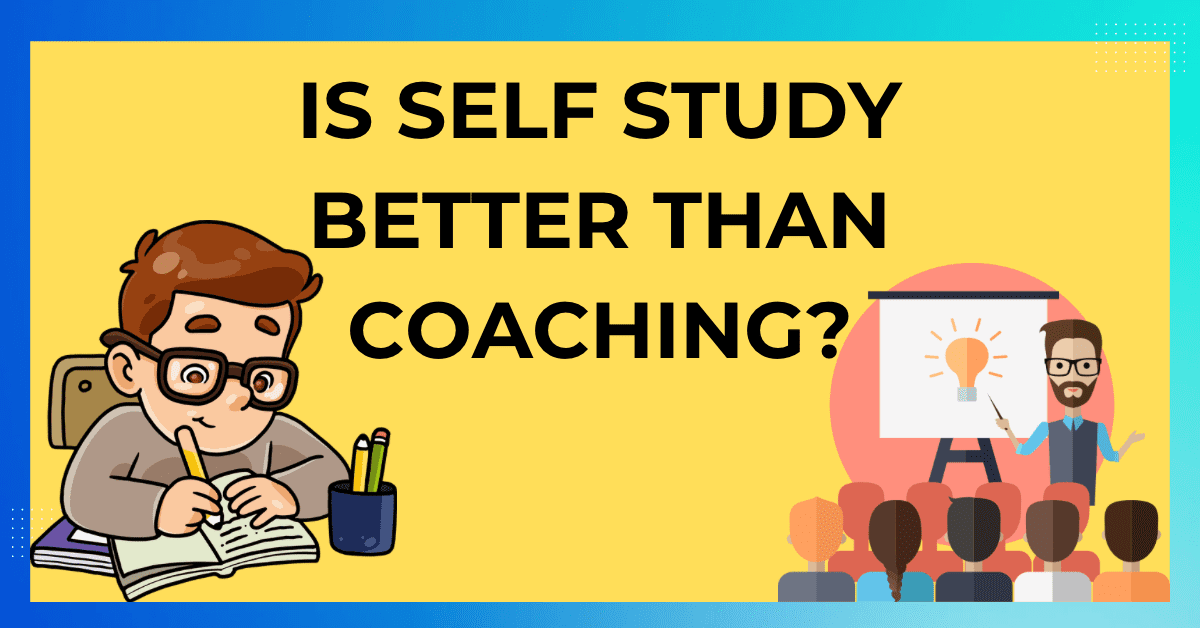
In the fast-paced world of academic success, students often find themselves at a crossroads when it comes to choosing between self-study and coaching.
With the primary goal of achieving excellence, it becomes required to analyse and understand the pros and cons of each approach.
In this comprehensive blog post, we aim to delve into the depths of this debate on whether self-study truly holds the key to successes or coaching is a required support system.
Let’s explore the benefits and drawbacks of each method, keeping in mind the specific scenarios of JEE, NEET, UPSC, and all students in general.
Benefits of Self Study
Self-study has long been promoted as an effective method for learning, and for good reason. Here are several advantages of embracing self-study:
1. Flexibility and Personalized Learning
One of the key advantages of self-study is the freedom and flexibility it offers. Students can create their own study schedule, it to their individual needs, and learn at their own pace. This personalized approach allows for a deeper understanding of subjects and can cater to specific learning preferences.
2. Independent Problem-Solving Skills
When students engage in self-study, they develop essential problem-solving skills. Without external support, they are encouraged to actively seek solutions and develop a sense of self-reliance. This fosters critical and analytical thinking abilities, which are invaluable not only in academics but also in real-life scenarios.
3. Holistic Subject Mastery
Self-study provides an opportunity for students to explore subjects in a comprehensive manner. By delving into books, online resources, and supplementary study materials, they can gain a deeper understanding and develop a holistic knowledge base. This broad perspective can prove beneficial when faced with complex questions.
4. Cost-Effective Approach
The financial aspect is a significant consideration for many students and their families. Self-study is often more cost-effective compared to coaching, as it eliminates the need for expensive tuition fees and related expenditures. This makes self-study an attractive option for those looking to save money while still achieving academic success.
For additional insights on the benefits of self-study, read our blog post on the advantages of self-study.
Advantages of Coaching
While self-study offers numerous benefits, coaching also presents several advantages that cannot be ignored. Let’s explore why many students opt for coaching:
1. Structured Learning Environment
Coaching institutes provide a structured learning environment tailored to the requirements of the competitive exams. These institutions follow a well-designed curriculum, ensuring that students cover the entire syllabus within a specified timeframe. This structure can be reassuring for students who prefer a systematic approach to learning.
2. Expert Guidance and Mentorship
One of the major advantages of coaching is access to experienced teachers and mentors who specialize in the respective subjects. These experts can provide valuable guidance, clarify doubts, and offer insights on exam patterns and strategies.
The presence of a knowledgeable mentor can boost students’ confidence and help them navigate the complexities of the exams with ease.
3. Competitive Ambience and Peer Learning
Coaching institutes foster a competitive environment where students come together and push each other to excel. The presence of like-minded peers can be motivating, providing an opportunity for healthy competition and collaborative learning.
Interacting with fellow aspirants allows for the sharing of ideas, knowledge, and diverse perspectives.
4. Exam-Focused Preparation
Coaching centre’s equip students with a curated set of study materials, practice tests, and mock exams that are specifically designed to align with the exam patterns.
This exam-focused preparation ensures that students are well-prepared for the challenges they will face during the actual exams.
Continue reading our in-depth comparison of self-study and coaching for JEE to gain further insights.
Comparing Self Study and Coaching for JEE
Scoring well in the JEE (Joint Entrance Examination) is a dream for many engineering aspirants. Let’s evaluate whether self-study or coaching is a better option for JEE preparation.
1. Self Study for JEE
Self-study for JEE demands discipline, dedication, and effective time management. With numerous online resources, books, and study materials available, self-study can be a viable option for those with strong self-motivation and the ability to create a robust study plan.
However, it is important to consider that self-study requires consistent self-assessment and a strategic approach to cover all topics thoroughly. Without the guidance of coaching, students need to proactively seek doubt clarification and engage in effective revision practices.
2. Coaching for JEE
Coaching institutes for JEE preparation offer a structured curriculum, expert guidance, and a competitive learning environment. This combination can greatly benefit students who thrive in a systematic setup and appreciate regular assessments and mock exams.
Coaching institutes also provide a platform for doubt clarification and addressing weak areas promptly. The presence of experienced faculty members who possess in-depth knowledge can be highly advantageous as they guide students through the intricacies of the JEE syllabus

Self Study vs. Coaching for NEET: Which is More Effective?
For medical aspirants, cracking the National Eligibility cum Entrance Test (NEET) is the ultimate goal. Let’s analyze whether self-study or coaching proves to be a more effective strategy for NEET preparation.
1. Self Study for NEET
Self-study for NEET requires rigorous self-discipline and meticulous planning. Students need to gather comprehensive study materials, refer to relevant books, and make use of online resources.
Self-study can be an effective approach for students who possess strong self-motivation, the ability to stay focused, and a structured study plan.
However, it is crucial to ensure that all topics are covered and doubts are clarified effectively. Regular self-assessment, online practice tests, and mock exams should be an integral part of the self-study routine to evaluate readiness for the actual NEET exam.
2. Coaching for NEET
Coaching institutes for NEET offer a structured approach to curriculum, expert guidance, and an environment conducive to learning.
With experienced faculty members, coaching institutes provide students with a platform to clarify doubts, learn tips and tricks, and stay aware of the latest exam patterns.
Regular practice tests and assessments are conducted to evaluate progress and identify areas that need improvement. The presence of peers in the coaching environment can be motivating, allowing for healthy competition and the sharing of valuable insights.
To dive deeper into the topic of self-study versus coaching for NEET, refer to our comprehensive analysis of NEET preparation methodologies.
Self Study vs. Coaching for UPSC: Finding the Right Path
The Union Public Service Commission (UPSC) examination is a highly esteemed and competitive exam for those aspiring to serve their country through civil services. Let’s explore whether self-study or coaching is the ideal path for UPSC preparation.
1. Self Study for UPSC
Preparing for UPSC through self-study is a challenging yet rewarding effort. It requires endless dedication and perseverance to cover a vast syllabus.
Self-study demands creating a well-structured study plan, referring to standard books and study materials, and staying updated with current affairs.
Aspirants deciding for self-study should engage in self-assessment, practice answer writing, and focus on time management. Joining online forums, participating in mock interviews, and seeking guidance from successful UPSC candidates can enhance the effectiveness of self-study.
2. Coaching for UPSC
Coaching institutes for UPSC offer specialised guidance, expert faculty members, and structured study materials catered to the UPSC examination.
The guidance received from seasoned mentors can prove invaluable in understanding the intricate exam patterns, syllabus, and preparing strategically.
Coaching institutes also provide regular mock tests, essay writing practice, and group discussions to develop well-rounded skills. Interaction with fellow aspirants and the opportunity to learn from each other’s strengths and weaknesses can enhance overall performance.
Is Self Study Better Than Coaching for All Students?
While we’ve explored the impact of self-study and coaching in specific contexts, it’s important to consider whether self-study is better than coaching for all students in general. Here are a few factors to contemplate:
- Individual Learning Style: Every student possesses a unique learning style. Some may thrive in a self-study environment, while others may seek the structure and guidance that coaching provides. Understanding one’s learning style can help determine which path is more suitable.
- Motivation and Discipline: Self-study requires a high level of motivation and discipline to stay focused and consistent. Students who can maintain these qualities throughout their studies can excel in self-study. However, coaching can provide the necessary support and accountability for those who struggle with self-motivation.
- Availability of Resources: The availability of resources plays a crucial role in deciding between self-study and coaching. Students in areas with limited access to coaching institutes may benefit more from self-study, whereas those with ample coaching options may find it beneficial to seek professional guidance.
- Financial Considerations: Coaching can be a significant financial commitment for many students and their families. Conversely, self-study can provide a more cost-effective alternative. Weighing the financial implications is essential in determining the right approach.
In the end, the choice between self-study and coaching depends on various factors mentioned above, as well as personal preference and circumstances. It is important to evaluate individual needs and goals to make an informed decision.
Conclusion
Choosing between self-study and coaching is an important decision that can significantly impact a student’s academic journey. Throughout this blog post, we have examined the benefits of self-study, advantages of coaching, and the effectiveness of these approaches in the contexts of JEE, NEET, UPSC, and all students in general.
In summary, self-study offers flexibility, personalized learning, and cost-effectiveness, while coaching provides structure, expert guidance, and a competitive learning environment. The decision between self-study and coaching depends on individual learning styles, motivation, resources, and financial considerations.
Ultimately, there is no one-size-fits-all answer to whether self-study is better than coaching. It is essential for students to evaluate their unique circumstances, academic goals, and learning preferences to identify the approach that aligns with their needs.
For answers to frequently asked questions about self-study versus coaching, refer to the section below.
FAQs (Frequently Asked Questions): Is Self Study Better Than Coaching?
1. Is self-study for JEE a viable option?
Yes, self-study for JEE can be a viable option for students who possess strong self-motivation, effective time management skills, and a well-structured study plan. With the abundance of books, online resources, and practice materials available, self-study can help students achieve success in the JEE examination.
2. Should I opt for coaching or self-study for NEET preparation?
The choice between coaching and self-study for NEET preparation depends on individual preferences and circumstances. Self-study requires discipline, self-assessment, and a comprehensive study plan, while coaching offers expert guidance, structured learning, and supplementary study materials. Consider factors such as motivation, available resources, and learning style to make an informed decision.
3. Can self-study be effective for UPSC preparation?
Yes, self-study can be effective for UPSC preparation. However, it requires immense dedication, self-motivation, and meticulous planning. Aspirants opting for self-study should create a well-rounded study plan, refer to standard books and study materials, stay updated on current affairs, and seek guidance from successful UPSC candidates.
4. Can self-study be better than coaching for all students in general?
Whether self-study is better than coaching for all students in general depends on individual needs, preferences, and circumstances. Factors such as learning style, motivation, discipline, resource availability, and financial considerations should be considered before making a decision. Evaluating these aspects will help determine which approach is more suitable.
5. What factors should I consider when choosing between self-study and coaching?
Several factors should be considered when choosing between self-study and coaching, including individual learning style, motivation and discipline levels, resource availability, and financial considerations. Understanding one’s learning preferences, goals, and personal circumstances will aid in making an informed decision.
Note: The information provided in this blog post is for informational purposes only and should not be considered as professional advice. It is recommended to consult with educational experts, mentors, or counselors for personalized guidance and support.